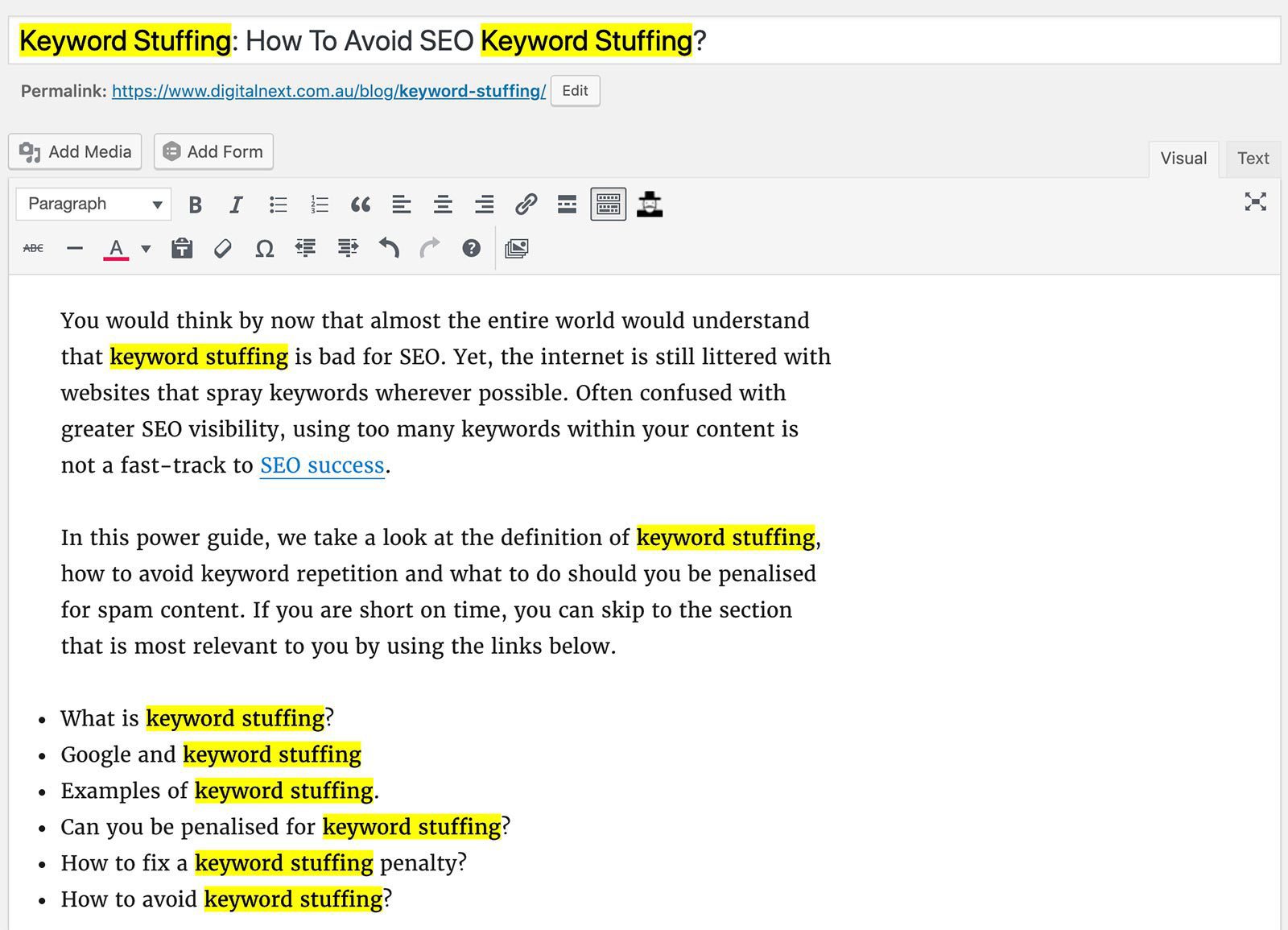
You would think by now that everyone would understand that keyword stuffing is bad for SEO. Yet, the internet is still littered with stuffed crust landing pages. Often confused with greater SEO visibility, using too many keywords within your content is not a fast-track to SEO success. Here’s how to avoid keyword stuffing and keep your content adored by Google.
How to avoid keyword stuffing?
In this power guide, we take a look at the definition of keyword stuffing, how to avoid keyword repetition and what to do should you be penalised for spam content. If you are short on time, you can skip to the section that is most relevant to you by using the links below.
If you are unsure about keyword density for WordPress SEO, you should check out the Yoast SEO or Rank Math plugin as both of these tools come with keyword density checks for the content of your website. Now, let’s stuff our faces with our ultimate guide to keyword stuffing.
What is keyword stuffing?
Since the very early stages of SEO, keyword stuffing (or spamdexing) has been a much talked about topic. In summary, keyword stuffing is caused by inserting a larger than required volume of keywords into your content, meta tags and page titles. The reason why people stuff keywords are to artificially increase a certain page’s rankings in search results.
The goal? To acquire more traffic to your website.
As most SEO professionals will tell you, keyword stuffing is unethical. In fact, you will find that most keyword-stuffed websites are those of a malicious nature. The worst offenders even go to the following lengths to maximise keyword count:
- Matching font to the background colour of the website.
- Setting font sizes to zero, hiding keywords from users.
- Placing keywords behind images.
- Writing normal content and then gibberish underneath.
According to Google, keyword repetition is not only unethical — it’s also completely ineffective with modern-day ranking signals. The increasingly sophisticated algorithms that Google deploys to monitor rankability are far more advanced than you think. Here’s what Google has to say on the subject matter.
Google’s official advice on keyword stuffing
It’s not often that Google will officially announce how to structure your website to benefit SEO. Yet, they seemingly are flying the flag strongly when it comes to keyword stuffing. In an official statement via an article on irrelevant keywords on Google Search Central, Google states:
“Filling pages with keywords results in a negative user experience, and can harm rankings. Focus on creating useful, information-rich content that uses keywords appropriately in context.”
Google then proceeds to state that key examples of keyword stuffing include:
- Lists of phone numbers without substantial added value
- Blocks of text listing cities and states a webpage is trying to rank.
- Repetition of the same words so often that it sounds unnatural.
As you can see, the emphasis is placed on adding value to your website visitors with content that is contextually relevant. Google is a search tool for users to find relevant information about their query. As such, your page content should help each and every visitor find the answers they are looking for without trying to game the algorithm.
Our own example of keyword stuffing
If you are unsure whether your website would qualify for the award of ‘most stuffed content’, take a look at our own example of what keyword stuffing looks like in 2020. You will notice from our clickable links at the top of this article, we do not continually use the phrase ‘keyword stuffing’. We have mixed this up with other keyword variants. Had we not, the content would look something like the below.

Now, while this is contextually relevant and actually does not read all that bad, it’s still a little spammy. Within a matter of 33 words, the target keyword is featured within 20% of the total keyword count. Given that we want to introduce the target keyword elsewhere within this article, we decided that stuffing keywords, particularly within this section of the article, is not all that important.
When considering keywords for best practice eCommerce content writing or blog articles, try to find at least 5 to 6 variants. This will ensure that you are less likely to stuff a particular keyword and more likely to rank for a variety of terms. It’s a win, win for you and your readers.
Can I receive a keyword stuffing penalty?
In short, yes you can receive a keyword stuffing penalty.
Although Google Webmasters will not always explicitly tell you that you have been penalised for keyword stuffing, your rankings will. The penalty itself will not be a harsh penalty that will take your website down off search engine results pages, but rather, the pages that are stuffed with too many keywords will not rank anywhere near as strongly as they should.
Typically, what you will see is a short, sharp rise in SEO rankings for any keyword-stuffed pages. Then, over a period of a few days or a few weeks, these rankings will ever so slowly start to diminish. The earliest signs that you have received a keyword stuffing penalty will be that your traffic to the penalised pages sharply decreases. If you are currently experiencing this, keep on reading to find out how to fix your keyword stuffing penalty.
How to fix a keyword stuffing penalty?
If Google has deemed your website guilty of using hidden text or keyword repetition, you may have been penalised partially or across your entire website. You may not know this at first, but should you see a huge decline in traffic to key pages, it’s wise to check for keyword spam.
To fix a keyword stuffing penalty, simply follow the steps below.
- Go to Google Search Console > Crawl > Fetch.
- Fetch pages from the affected portions of your website.
- Look for text that is similar in colour to the body of the web page.
- Look for hidden text using CSS styling or positioning.
- Remove any hidden text so that it’s obvious to a human user.
- Fix or remove any paragraphs of repeated words without context.
- Fix <title> tags and alt text containing strings of repeated words.
- Remove any other instances of keyword stuffing.
- Submit a reconsideration request after fixing these issues.
The time it takes to recover from a keyword stuffing penalty can vary. The more active your website, the more likely Google will recrawl without you continually asking for a manual crawl. However, there is no guarantee Google will lift the penalty quickly. Therefore, it is just simply better to just avoid keyword stuffing altogether.
The final word.
Avoiding keyword stuffing is actually quite simple. It starts with writing rich content that is human-first. Then, it ends with hitting CTRL+F or CMD+F on your browser and typing in the keyword you want the page to rank for within SERPs. If you start to see more yellow highlighted text than unhighlighted text, it’s time to reign in some of that keyword repetition.
When it comes to keyword density, there are many varied opinions. However, the general rule of thumb is that a single keyword should make up around 5% of your total word count. This has been explained previously on a Moz Whiteboard Friday. Although keywords should be featured strongly within your content, they should not be stuffed to create content that is out of context for the reader. It just looks so nasty and reads like garbage.
Simply put, the most efficient way to avoid keyword stuffing is to firstly forget that it exists and instead concentrate on creating content that is interesting to the reader. Once you are done, you can always go back through the article and sprinkle a few keywords here and there to ensure they feature around 5% of your total keyword count.
Don’t forget, there will be many variations of your target keyword, for example:
- HP 62 Ink
- HP 62 Black Ink
- Cheap HP 62 Ink
- HP 62 Black Ink Cartridge
- Black HP 62 Ink
As such, when you do go back through your content you will want to sprinkle as many variations, without spamming, to ensure that your page begins to rank for the variety of search phrases the same type of audience will use to find your website.
Leave A Comment